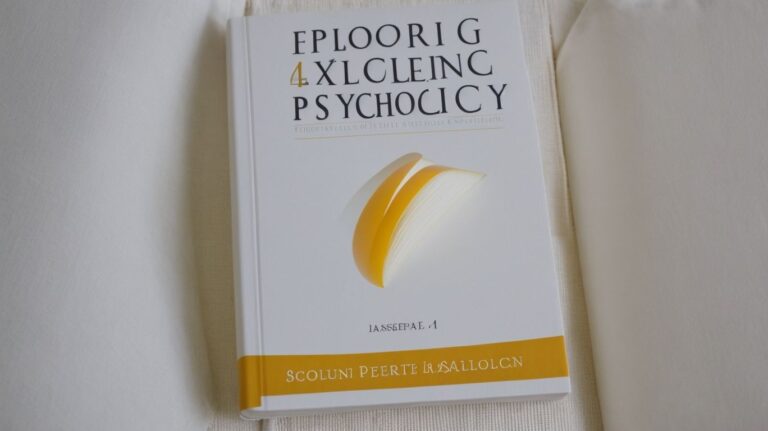Have you ever wondered what sets new-school psychology apart from traditional psychology? In this article, we will delve into the key principles, techniques, and benefits of this innovative approach to mental well-being.
From a holistic approach to emphasizing personal growth, new-school psychology offers a fresh perspective on mental and emotional health. Discover how you can incorporate mindfulness, positive psychology, and cognitive behavioral therapy into your daily life to enhance your overall well-being and relationships.
Contents
- 1 What Is New-school Psychology?
- 2 How Does New-school Psychology Differ From Traditional Psychology?
- 3 What Are the Key Principles of New-school Psychology?
- 4 What Are the Techniques Used in New-school Psychology?
- 5 What Are the Benefits of New-school Psychology?
- 6 How Can One Incorporate New-school Psychology in Their Daily Life?
- 7 Frequently Asked Questions
- 7.1 What is the definition of New-school Psychology?
- 7.2 What are some key perspectives in New-school Psychology?
- 7.3 How does New-school Psychology differ from traditional psychology?
- 7.4 What are some practical applications of New-school Psychology?
- 7.5 How does New-school Psychology view mental health?
- 7.6 What are some criticisms of New-school Psychology?
What Is New-school Psychology?
New-school psychology represents a modern approach to understanding human behavior and mental processes, incorporating contemporary perspectives such as humanistic psychology.
Humanistic psychology, a central tenet of new-school psychology, emphasizes individual potential for growth, self-actualization, and personal fulfillment. This approach focuses on the unique qualities of each person and their subjective experiences, diverging from traditional psychoanalytic or behaviorist viewpoints.
Carl Rogers and Abraham Maslow, prominent figures in humanistic psychology, introduced concepts like unconditional positive regard and hierarchy of needs, which have significantly influenced counseling and therapy practices in the contemporary landscape.
How Does New-school Psychology Differ From Traditional Psychology?
New-school psychology diverges from traditional psychology by focusing on behavior from cognitive and psychodynamic perspectives, departing from conventional approaches.
Unlike traditional psychology, new-school psychology is deeply rooted in the belief that behavior is influenced by internal thought processes, emotions, and unconscious drives. This shift in perspective has led to a greater emphasis on understanding how individuals perceive, think, and make decisions.
Moreover, cognitive psychology highlights the importance of mental processes such as memory, problem-solving, and language in shaping behavior. On the other hand, psychodynamic psychology delves into the unconscious mind, childhood experiences, and unresolved conflicts to unravel the complexities of human behavior.
What Are the Key Principles of New-school Psychology?
The key principles of new-school psychology encompass biological influences, evolutionary psychology insights, and a departure from historical perspectives.
Biological influences play a crucial role in shaping human behavior, with modern psychology delving deep into genetics, neuroscience, and physiology to understand the intricate workings of the mind.
Evolutionary psychology, a significant component of this approach, examines how our ancestral past influences present-day behaviors, emphasizing the adaptive nature of certain psychological traits.
This new-school paradigm represents a departure from traditional viewpoints that solely focused on environmental and sociocultural factors, recognizing the complex interplay between genetic predispositions and external stimuli in shaping human psychology.
Holistic Approach
A holistic approach in new-school psychology considers individuals as complex beings with diverse needs, echoing the humanistic ideals championed by figures like Abraham Maslow.
The core principle of this approach is the belief that each person’s psychological well-being is intricately influenced by various interconnected aspects of their life, including their emotions, thoughts, behavior, and environment.
By emphasizing the importance of understanding the unique experiences and inner motivations of individuals, new-school psychologists strive to promote a deeper sense of self-awareness and personal growth.
This holistic perspective rejects the reductionist views of traditional psychology and instead embraces the idea of integrating mind, body, and spirit to foster overall wellness.
Mind-Body Connection
The mind-body connection principle in new-school psychology emphasizes the interplay between mental processes and physical experiences, aligning with the holistic views of Jean Piaget.
This principle posits that our thoughts, emotions, and beliefs can significantly impact our physiological health and well-being. The understanding is that our mental state can influence bodily functions, such as immune responses, hormonal balances, and even susceptibility to illnesses.
Proponents of this theory argue that by fostering positive mental states through mindfulness practices like meditation and cognitive-behavioral therapy, individuals can enhance their overall physical health and resilience.
Focus on Prevention
New-school psychology places an emphasis on preventive strategies to enhance mental health and well-being, reflecting the proactive stance advocated by mental health experts like Amy Morin.
In line with this approach, one of the key strategies in mental health prevention is early intervention, which aims to address issues before they escalate. By recognizing warning signs and risk factors, individuals can take steps to mitigate potential challenges and promote overall well-being.
- Another important aspect emphasized in new-school psychology is the promotion of healthy lifestyle habits, such as regular exercise, balanced nutrition, and sufficient sleep. These practices not only benefit physical health but also play a crucial role in maintaining mental wellness.
- Fostering social connections and building supportive relationships are essential components of proactive mental health care. Engaging in meaningful interactions, participating in community activities, and seeking professional help when needed all contribute to a strong support system that promotes resilience.
Emphasis on Personal Growth
New-school psychology emphasizes personal growth as a central tenet, aligning with the humanistic ideals of promoting self-actualization championed by Carl Rogers.
Self-actualization, a concept at the core of humanistic psychology, focuses on individuals reaching their fullest potential and becoming the best version of themselves. Carl Rogers, a pioneer in the field, emphasized the importance of creating a nurturing environment that allows individuals to explore their true selves and flourish. This approach values the uniqueness of each person’s journey and highlights the significance of personal agency and responsibility in shaping one’s growth and development. Through practices like mindfulness, introspection, and fostering authentic connections, individuals can tap into their inherent potential and lead more fulfilling lives.
What Are the Techniques Used in New-school Psychology?
New-school psychology employs various techniques rooted in cognitive psychology to understand and address behavioral patterns and mental processes.
Cognitive psychology emphasizes the study of mental processes such as attention, memory, problem-solving, and decision-making, offering insights into how individuals perceive, think, and reason.
Through techniques like cognitive restructuring, individuals are taught to identify and challenge negative thought patterns, replacing them with more constructive beliefs to promote overall well-being.
Behavioral modification strategies, like operant conditioning and exposure therapy, are commonly used to address specific behavioral issues by reinforcing positive behaviors or desensitizing individuals to triggers.
Mindfulness
Mindfulness, a core technique in new-school psychology, involves cultivating present-moment awareness and acceptance, reflecting the practices advocated by mindfulness experts like Emily Roberts.
Present-moment awareness encourages individuals to fully engage in their current experiences without judgment or attachment to the past or future. By practicing mindfulness, one can enhance their ability to observe their thoughts and emotions without being overwhelmed by them, fostering a greater sense of self-awareness and emotional regulation. Emily Roberts and other mindfulness experts emphasize the importance of staying grounded in the present, as it can lead to reduced stress, improved mental clarity, and overall well-being.
Positive Psychology
Positive psychology techniques in new-school psychology emphasize strengths, virtues, and well-being, aligning with the principles discussed at conferences like the Thayer Conference.
These techniques focus on cultivating positive emotions, fostering resilience, and nurturing authentic relationships to enhance individuals’ overall mental wellness.
In new-school psychology, practitioners aim to shift the focus from simply treating mental illness to also nurturing mental well-being and flourishing. By incorporating tools such as gratitude practices, mindfulness exercises, and character strengths assessments, psychologists in this field help individuals tap into their inner resources for growth and fulfillment.
Cognitive Behavioral Therapy
Cognitive Behavioral Therapy (CBT) is a prominent technique in new-school psychology, integrating cognitive restructuring and behavioral modification methods attributed to experts like Albert Bandura.
Albert Bandura, a pioneer in the field of psychology, emphasized the importance of observational learning and how our thoughts influence our behaviors. CBT works on the fundamental principle that our thoughts, feelings, and behaviors are interconnected, and changing one can lead to changes in the others. Through the process of cognitive restructuring, individuals learn to identify and challenge negative thought patterns, replacing them with more positive and adaptive ones.
Behavioral modification techniques used in CBT focus on changing maladaptive behaviors through various strategies such as exposure therapy, relaxation training, and systematic desensitization. By combining these cognitive and behavioral approaches, CBT helps individuals develop healthier coping mechanisms and achieve long-lasting positive changes in their mental health.
What Are the Benefits of New-school Psychology?
New-school psychology offers benefits such as improved mental health, enhanced personal growth, and enriched educational experiences.
One of the key advantages of new-school psychology is its holistic approach towards mental well-being. By combining traditional therapeutic methods with modern techniques, individuals can experience a more comprehensive and personalized treatment plan.
This approach not only targets symptoms but also delves deeper into the root causes of mental health issues, leading to long-lasting and sustainable improvements. It emphasizes self-awareness, self-acceptance, and self-enablement, fostering a positive mindset and emotional resilience.
New-school psychology encourages personal growth by promoting self-discovery, introspection, and continuous learning. Through practices like mindfulness, cognitive behavioral therapy, and positive psychology, individuals can cultivate a growth mindset and develop the skills needed to overcome challenges and thrive.
New-school psychology integrates educational components into therapeutic sessions, offering valuable insights and tools for self-improvement. By educating individuals about psychology, emotional intelligence, and communication skills, it enables them to take control of their mental health and overall well-being.
Improved Mental and Emotional Well-being
New-school psychology contributes to enhanced mental and emotional well-being by incorporating strategies and techniques endorsed by mental health resources like Verywell Mind.
These innovative approaches emphasize the importance of self-compassion, mindfulness practices, and cognitive-behavioral techniques in promoting psychological wellness. Through a combination of evidence-based interventions and personalized therapy sessions, individuals can develop resilience, cultivate positive coping mechanisms, and enhance their emotional intelligence.
The integration of holistic modalities such as yoga, meditation, and art therapy into treatment plans fosters a comprehensive approach to mental health care. By addressing the mind-body connection and exploring alternative healing practices, new-school psychology encourages individuals to embrace a well-rounded approach to self-care and personal development.
Enhanced Personal Growth
New-school psychology fosters enhanced personal growth by promoting self-actualization and self-improvement, aligning with the principles of Maslow and Rogers.
These psychological paradigms emphasize the importance of individuals striving towards fulfilling their innate potential and becoming the best version of themselves. By focusing on intrinsic motivations, individuals are encouraged to explore their innermost desires and values, leading to a deeper understanding of themselves and their place in the world.
Through practices such as mindfulness, cognitive-behavioral therapy, and positive psychology, new-school psychology equips individuals with tools to cultivate self-awareness, resilience, and emotional intelligence. This self-awareness lays the groundwork for personal growth and a greater sense of fulfillment in various aspects of life.
Better Relationships
New-school psychology emphasizes building better relationships through empathetic communication and fostering trust, echoing the interpersonal theories of Carl Rogers.
By incorporating the principles of active listening, unconditional positive regard, and genuineness, individuals can cultivate more meaningful and fulfilling connections with others. This approach encourages individuals to engage in open and honest dialogues, where feelings and thoughts are respected and validated.
Furthermore, new-school psychology advocates for the importance of self-awareness and emotional intelligence in understanding and responding to the needs and emotions of others. By prioritizing empathy and compassion, individuals can create a supportive and nurturing environment that enhances mutual understanding and deepens interpersonal bonds.
How Can One Incorporate New-school Psychology in Their Daily Life?
Incorporating new-school psychology principles into daily life involves embracing humanistic ideals, enhancing personal growth, and nurturing positive relationships.
Embracing humanistic ideals in everyday life means valuing each individual’s unique qualities and potential, promoting self-actualization, and fostering a sense of intrinsic worth.
Enhancing personal growth can be achieved through self-reflection, setting achievable goals, and seeking continuous learning opportunities to expand one’s knowledge and skills.
Nurturing positive relationships entails practicing empathy, effective communication, and mutual respect to create supportive social networks that contribute to emotional well-being.
Practicing Mindfulness
Engaging in mindfulness practices is a cornerstone of incorporating new-school psychology into daily life, drawing inspiration from experts like Kendra Cherry.
Mindfulness techniques such as meditation, deep breathing exercises, and body scans are proven methods to reduce stress, improve focus, and enhance overall well-being. By dedicating time each day to centering oneself through these practices, individuals can cultivate a greater sense of self-awareness and emotional regulation.
According to Kendra Cherry, mindfulness also plays a crucial role in managing anxiety, depression, and other mental health conditions, as it encourages individuals to observe their thoughts and feelings without judgment.
Focusing on Personal Growth
Prioritizing personal growth and self-improvement forms a vital component of integrating new-school psychology principles into daily life, enriching educational experiences and mental well-being.
By consistently setting achievable goals and fostering a growth mindset, individuals can enhance their resilience and adaptability. Embracing self-reflection and fostering a positive self-image accelerates personal development and enables individuals to overcome challenges effectively. Explore the perspectives of new-school psychology by referring to this reputable source.
Dedicating time to continuous learning through reading, attending workshops, or seeking mentorship opportunities fosters intellectual growth and expands one’s knowledge base. Incorporating mindfulness practices and regular self-care routines promotes emotional well-being and helps in managing stress levels, ultimately leading to a more fulfilling and purpose-driven life.
Building Positive Relationships
Cultivating positive relationships through empathetic communication and mutual trust aligns with new-school psychology principles, drawing insights from figures like John B. Watson and Kendra Cherry.
Empathy is a cornerstone of nurturing relationships, allowing individuals to connect deeply on an emotional level. Acknowledging and validating feelings of others fosters understanding and promotes a sense of emotional safety. Building trust requires transparency, honesty, and active listening to establish a foundation of reliability. Implementing effective communication techniques such as reflective listening and nonverbal cues enhances relationship dynamics. Recognizing and appreciating each other’s differences further strengthens bonds, creating a supportive and inclusive environment.
Frequently Asked Questions
What is the definition of New-school Psychology?
New-school Psychology is a modern approach to understanding the human mind and behavior, which incorporates elements from traditional psychology, as well as other disciplines such as neuroscience, sociology, and philosophy.
What are some key perspectives in New-school Psychology?
Some key perspectives in New-school Psychology include the importance of cultural and societal influences on individual behavior, the role of self-actualization and personal growth, and the emphasis on individual strengths and resilience.
How does New-school Psychology differ from traditional psychology?
New-school Psychology differs from traditional psychology in that it takes a more holistic approach, considering not only the individual, but also their environment and context. It also places a greater emphasis on positive traits and potential for growth, rather than focusing solely on pathology and illness.
What are some practical applications of New-school Psychology?
New-school Psychology has practical applications in fields such as counseling, education, organizational development, and community interventions. It can also be used to promote mental health and well-being in individuals and groups.
How does New-school Psychology view mental health?
New-school Psychology views mental health as a state of well-being that encompasses not just the absence of mental illness, but also the presence of positive emotions and the ability to adapt and cope with life’s challenges.
What are some criticisms of New-school Psychology?
Some criticisms of New-school Psychology include the lack of a clear and unified definition, the challenge of integrating multiple perspectives, and the potential for oversimplifying complex issues. Additionally, there is ongoing debate about the effectiveness and validity of some New-school Psychology interventions.




